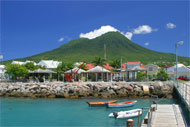Online Off-shore Gaming license in Saint Kitts and Nevis

The islands of Saint Kitts and Nevis are found in the Caribbena Sea, two kilometers one from the other and 250 kilometers southeast of Puerto Rico. The islands were colonized by the British in 1620. The economy of Saint Kitts and Nevis was based on African slavery and sugar cane. In 1983, Saint Kitts and Nevis received its independence from Great Britain and is now oficially considered the Federation of Saint Kitts and Nevis (the “Federation”). Under the current constitutional agreement between the islands, both Nevis and the Federation are each allowed to enact their own laws. The two pillars of the economy of the Federation are financial and tourist services.
The Betting and Gaming (Control), 1999 (the “law”) allows online gaming in the Federation. The Law authorizes physical gaming, online gaming, horse betting and sports betting.
According to the Law, the physical games are defined as “…a game where a player is physically present in… “a betting casino, sporting event or gambling…” Internet gaming is defined as a game where “a player gives ….. valuable consideration to participate in the game …. through the use of an electronic or telecommunications device. A prize can be won according to the gaming laws…”.Sports betting is “making bets exclusively by telephone.”
To be issued a gaming license, a company must submit a company proposal together with an application form to the Ministry of Industry, Commerce and Interior Consumer Affairs (the “Ministry”).
If the applicant is a natural person, the application must be accompanied by a police report, copy of the passport and sworn declaration that states that the applicant is not an owner of a bank.
If the applicant is a corporation, the corporation must be incorporated and registered under the Law of Corporations of 1996. The application must include a police report for officials and shareholders and a sworn declaration that states that none of the officials or shareholders are owners of a bank.
All applications must include bank references and a processing fee for any natural person, shareholder and officer. After the application forms, business proposal and fees have been submitted, the Ministry reserves the right to request additional information. After the approval has been granted by the Ministry and the license issued, a concession fee must be paid. A gaming tax must also be paid annually. Each licensee is required to maintain a daily register of the funds collected and the type of gaming from which the income was earned.
The law establishes that a license to carry out physical gaming activity will only be granted if the applicant has or arranges a hotel of at least 200 guest rooms. The applicant must have a game room inside the hotel that gives tourists the freedom to use its installations. The corporate applicant must also prove that there are no shareholders or officials that have been convicted for a crime in any country.
Licensees with sports book betting or online gaming licenses should establish an account with a bank in San Cristobal, which is authorized under the Banking Law of 1991, to process gaming transactions. The Ministry must also approve the contents of publicity/marketing placed on the company´s website. According to the Law, no licensee is authorized to provide credits. All online gaming players should have enough funds deposited in their accounts to cover all bets. All players engaging in physical games must have enough funds on hand or deposited with the licensee.
The access to the website should be blocked for all residents of the Federation. All licensees must guarantee that any person that participates must be at least 18 years of age. Any changes in the company´s shareholders or directorate must immediately be reported to the Ministry. All licensees must submit audited financial statements annually to the Ministry.
The Federation´s gaming industry is mainly carried out in San Cristobal. The gaming industry depends greatly on the sponsorship of United States residents and tourists. Online gaming is mainly used by United States residents and tourists around the world are attracted to physical games. Online gaming was affected by the enactment of the Unlawful Internet Gambling Enforcement Act of 2006 by the federal government of the United States. This law prohibits United States credit card companies and financial institutions from sending payments to online gaming websites that are located outside the United States. Only one gaming website registered in San Cristobal accepts American players.